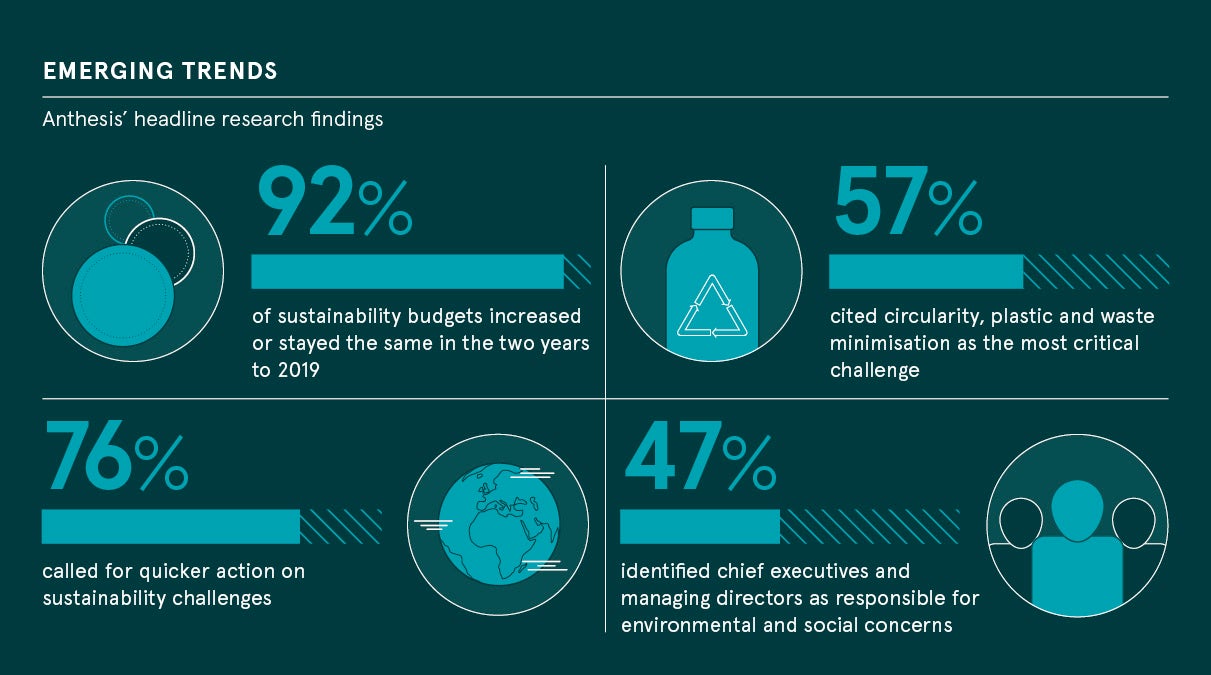The United Nations (UN) is calling the next ten years the decisive decade, with ambitious action needed to deliver sustainable development. Business, however, finds itself in a state of flux.
The landscape is changing, says Brad Blundell, UK managing director of Anthesis. “The last 24 months have been transformational. Gen Z and millennials are redrawing the map in favour of sustainable brands; not only are they environmentally aware and socially influential, but economically significant, too. The business-as-usual herd will soon be left with nowhere to run,” he says.
For companies and organisations alike, the pursuit of profit with purpose is easy to envision in principle, but often difficult to enact in practice. The opportunities are real; it is all about making sustainability happen.
Anthesis is the sustainability activator. As the largest dedicated team of sustainability professionals in the world, the group brings together the talents of more than 500 experts, operating in 40 countries, with offices in 17. The day job is driving sustainable performance on the ground, from Andorra to the United States.
Emerging trends and the C-suite
Every year, Anthesis publishes the findings of its Emerging Trends research, which signposts the direction of travel on sustainability and unpacks some of the issues involved.
On the upside, the latest report is positive on money matters, with nine out of ten respondents (92 per cent) confirming sustainability budgets either increased or stayed the same in the two years to 2019.
These findings support the view that sustainability has progressed from being a nice-to-have optional extra, to a must-have item of non-discretional spend.
There is an increasingly strong sense of urgency, but not the understanding to match
Sustainability is also seen as a C-suite issue, with almost half the respondents (47 per cent) identifying chief executives and managing directors as responsible for environmental and social concerns. Heads of finance, marketing and legal also ranked as important parties.
The bad news in the numbers, however, concerns the pace of change. Action on sustainability is simply too slow. More than three quarters of respondents (76 per cent) doubt things are happening quickly enough.
Commercial disconnect
For Fiona Place, director and supply chain lead at Anthesis, this disconnect between thinking and doing suggests a lack of conviction around the commercial imperative.
“There is an increasingly strong sense of urgency, but not the understanding to match. When it comes to sustainability, the C-suite now gets the what and the why, just not the how,” she says.
In response, Anthesis has developed a three-stage methodology for delivering sustainable performance, the Activator Approach. Whether working at the corporate-strategy level, or solving specific operational problems, it combines appropriate expertise and tools across a proven, end-to-end logic of change.
Strategic and systemic
The process of commercialising sustainability aspirations might begin with the introduction of key performance indicators into supplier contracts. Focusing on greenhouse gases (GHGs) or labour rights, for instance, could generate metrics for energy efficiency or ethical procurement.
It is important to be pragmatic, to benchmark and footprint, when deciding where to start a sustainability journey. It is also vital, however, to think strategically and holistically, if unintended consequences are to be avoided, says Debbie Hitchen, director and sustainable production and consumption lead at Anthesis.

“Under pressure to act, many companies merely react with knee-jerk responses or single-issue silo projects. Replacing plastics with glass, for example, might address plastics goals, but result in a significant increase in GHGs. Sustainability is systemic,” she says.
In addition to supporting more than 800 clients annually, from local authorities to corporate multinationals, Anthesis recognises the benefit in supporting early to growth-stage organisations. Anthesis Ventures invests in those who share its purpose in aligning with the UN’s Sustainable Development Goals. Helping startups build and scale, it is supported by Anthesis’s tech offering, comprising of more than 20 software solutions.
Blundell concludes: “Turning actionable insights into scalable impacts calls for an agile and defensible strategy that can adapt to future shocks. As evidenced by client attributes, successful organisations must be both resilient and productive. Making sustainability happen is not a one-off task. It’s a mindset with a bias for action and skills to match.”
For more information please visit anthesisgroup.com/decisivedecade
Emerging trends and the C-suite
Commercial disconnect
Strategic and systemic

